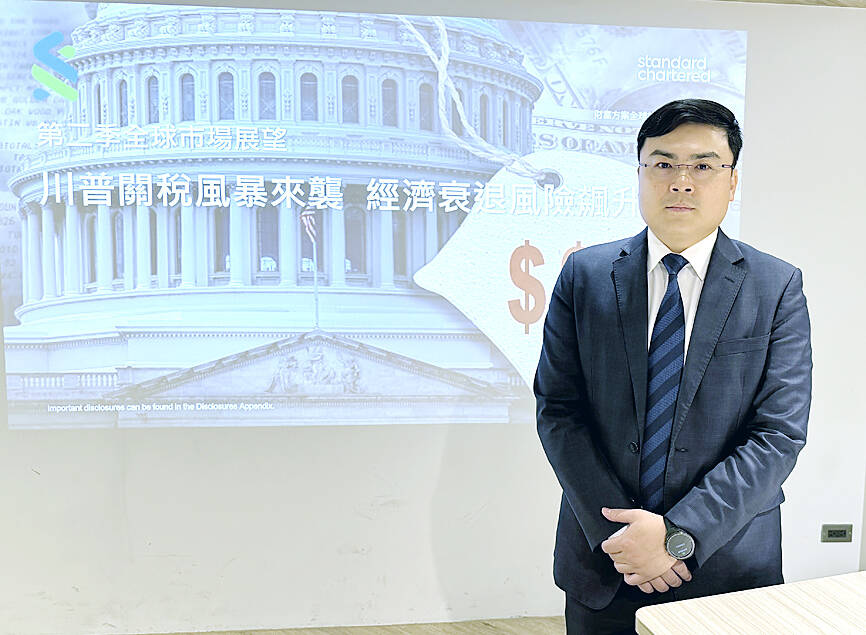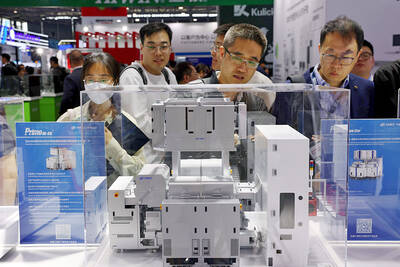Taiwan could see a decline in exports and GDP growth due to the US’ implementation of a 32 percent “reciprocal” tariff on Taiwanese goods from yesterday, economists said yesterday.
Taiwan’s exports to the US are likely to dampen in the coming 12 months, with a direct impact on GDP ranging from 1.2 to 2.5 percentage points, depending on the elasticity of US import demand, Standard Chartered Bank senior economist Kelvin Lau (劉建恆) said.
Taiwan’s tech sector — especially firms supplying advanced chips and information communications technology products — is expected to be less affected by the tariffs due to their global technology leadership positions.

Photo: CNA
The actual economic blow could be milder, as other competing markets are also subject to tariff barriers, he said.
“While the short-term pain is real, Taiwan’s relative competitiveness won’t be substantively eroded,” Lau said.
Taiwan’s central bank is expected to hold interest rates steady this year with the consumer price index expected to hover at about 2.1 percent, he said.
Standard Chartered stood by its forecast of 3 percent for Taiwan’s GDP growth this year, but it has seen intensifying downside risks, he added.
Allen Liu (劉家豪), head of wealth management strategy at Standard Chartered, urged Taiwanese manufacturers to assess the substitutability of their products in the global market.
“If there are no viable alternatives elsewhere, they may have stronger bargaining power with US companies and pass tariff costs onto US importers,” Liu said.
Further, the US does not have a supply chain of electronics and it would not be easy to move production lines to the US quickly, he said.
How Washington implements its tariff policy would shape related firms’ global deployment, he added.
Although the US claims economic strength, it is also under pressure to speed up trade negotiations, and US-Taiwan trade talks merit close attention, Liu said.
Moody’s shared similar observations, saying that Trump’s sweeping new tariffs represent the largest increase since the 1930s and the implications are unfolding across the world.
The new tariffs on Asian markets turned out more draconian than expected, which is unfavorable for the region, the ratings agency said.
The region is exposed to higher US tariffs directly and indirectly, it said, adding that direct exposure is the heaviest for economies such as Taiwan, China and Vietnam.
“This major shift in US trade policy is credit negative for the region, but we expect the vast majority of countries to negotiate rather than to retaliate through strategies such as establishing bilateral trade agreements or buying more US goods,” Moody’s said.

SEMICONDUCTOR SERVICES: A company executive said that Taiwanese firms must think about how to participate in global supply chains and lift their competitiveness Taiwan Semiconductor Manufacturing Co (TSMC, 台積電) yesterday said it expects to launch its first multifunctional service center in Pingtung County in the middle of 2027, in a bid to foster a resilient high-tech facility construction ecosystem. TSMC broached the idea of creating a center two or three years ago when it started building new manufacturing capacity in the US and Japan, the company said. The center, dubbed an “ecosystem park,” would assist local manufacturing facility construction partners to upgrade their capabilities and secure more deals from other global chipmakers such as Intel Corp, Micron Technology Inc and Infineon Technologies AG, TSMC said. It

EXPORT GROWTH: The AI boom has shortened chip cycles to just one year, putting pressure on chipmakers to accelerate development and expand packaging capacity Developing a localized supply chain for advanced packaging equipment is critical for keeping pace with customers’ increasingly shrinking time-to-market cycles for new artificial intelligence (AI) chips, Taiwan Semiconductor Manufacturing Co (TSMC, 台積電) said yesterday. Spurred on by the AI revolution, customers are accelerating product upgrades to nearly every year, compared with the two to three-year development cadence in the past, TSMC vice president of advanced packaging technology and service Jun He (何軍) said at a 3D IC Global Summit organized by SEMI in Taipei. These shortened cycles put heavy pressure on chipmakers, as the entire process — from chip design to mass

Germany is to establish its first-ever national pavilion at Semicon Taiwan, which starts tomorrow in Taipei, as the country looks to raise its profile and deepen semiconductor ties with Taiwan as global chip demand accelerates. Martin Mayer, a semiconductor investment expert at Germany Trade & Invest (GTAI), Germany’s international economic promotion agency, said before leaving for Taiwan that the nation is a crucial partner in developing Germany’s semiconductor ecosystem. Germany’s debut at the international semiconductor exhibition in Taipei aims to “show presence” and signal its commitment to semiconductors, while building trust with Taiwanese companies, government and industry associations, he said. “The best outcome

Semiconductor equipment billings in Taiwan are expected to double this year, as manufacturers in the industry are keen to expand production to meet strong global demand for artificial intelligence applications, according to SEMI, which represents companies in the electronics manufacturing and design supply chain. Speaking at a news conference before the opening of Semicon Taiwan trade show tomorrow, SEMI director of industry research and statistics Clark Tseng (曾瑞榆) said semiconductor equipment billings in Taiwan are expected to grow by an annual 100 percent this year, beating an earlier estimate of 70 percent growth. He said that Taiwan received a boost from a